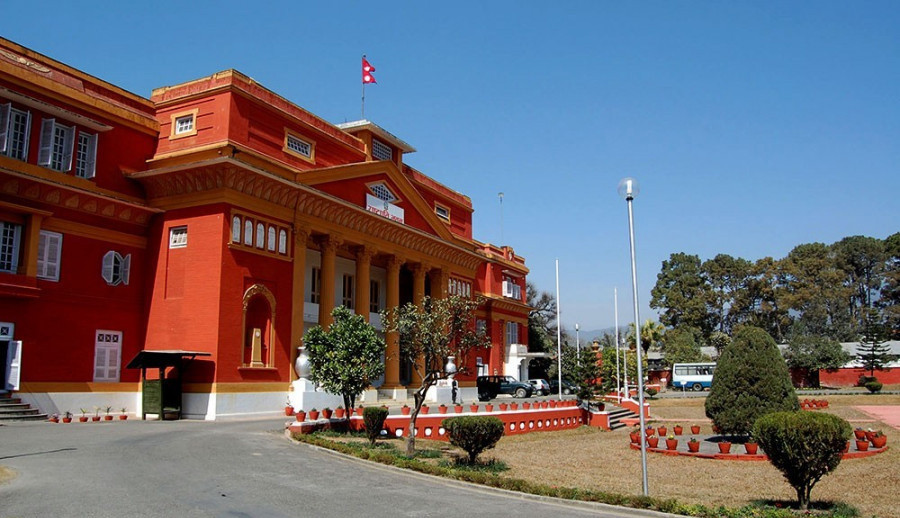National
Appointees to constitutional bodies administered oath of office
Appointment process has been completed even as writ petitions against the ordinance as per which they were recommended are sub-judice in the court.
Binod Ghimire
As many as 32 individuals appointed to various constitutional bodies, including the Commission for the Investigation of Abuse of Authority and the National Human Rights Commission, were administered oath of office and secrecy on Wednesday.
They were appointed on December 15 by a meeting of the Constitutional Council following an ordinance to amend the Constitutional Council Act.
Prime Minister Oli’s move of introducing the ordinance had attracted widespread criticism, as through the ordinance, he had sought to change the provisions of calling the Council meeting and taking decisions.
Oli’s ordinance move was challenged in the Supreme Court, but not even a single hearing was conducted.
Wednesday’s oath administration took place even as the move of introducing the ordinance remains sub-judice in the court.
Chief Justice Cholendra Shumsher Rana, one of the members of the Council, administered the oath of office to 32 appointees at Sheetal Niwas in the presence of President Bidya Devi Bhandari.
Bhesh Raj Adhikari, chief personal secretary to the President, said chiefs and members appointed for 11 constitutional bodies took the oath of office and secrecy in the presence of the President at Sheetal Niwas on Wednesday morning.
After their oaths, they were appointed to their concerned posts by President Bhandari.
A statement issued by the Office of the President said President Bhandari has appointed the office bearers at various constitutional bodies as per various articles of the constitution.
The appointments, however, have dragged fresh controversy, as all of them were appointed without going through a parliamentary hearing.
Laxman Lal Karna, who headed the parliamentary hearing committee until the House was dissolved, said the list of the appointees had reached the Parliament Secretariat after the government dissolved the Parliament on December 20.
Article 292 of the constitution provisions parliamentary hearings of judges to be appointed by the Judicial Council and those to be appointed to constitutional bodies by the Constitutional Council.
With the President dissolving the House on December 20 as per the recommendation of the government, the parliamentary hearing committee was also killed.
The government, however, decided to move ahead with the appointments, saying 45 days had passed since the recommendations had reached the Parliament Secretariat.
Rule 26 (2) of the Joint Parliamentary Meeting Regulation of the federal parliament says there would be no obstruction for the recommended people to assume office in constitutional bodies if the hearing committee fails to take any decision within 45 days of receiving the letter from the Council.
Karna, however, says the rule has been misinterpreted.
“The 45-day period stands only if the hearing committee had started its process and failed to complete the hearing,” Karna told the Post. “This is not the situation now, as the hearing committee had died before it received the list, as the House had been dissolved. Today’s oaths and appointments violate Article 292.”
Speaker Agni Sapkota and Vice President Nanda Bahadur Pun were not present at Wednesday’s oath ceremony.
Sapkota earlier this week had objected to the Council recommendations, saying it was taken without his knowledge. In a statement issued by the Parliament Secretariat, Sapkota said he was not informed about the December 15 Council meeting.
The December 15 Council meeting was attended by Prime Minister Oli, Chief Justice Rana and National Assembly chair Ganesh Prasad Timilsina.
Oli through the ordinance had changed the provisions regarding calling the Council meeting and taking decisions.
Clause 6 (3) of the Constitutional Council Act (Functions, Duties and Procedures) 2010 had it that at least five members must be present besides prime minister for the Council to convene its meeting. Similarly, Clause 6 (5) said that a decision must be taken based on consensus.
Since the deputy Speaker was yet to be elected, one member’s absence could stop the Constitutional Council from holding the meeting.
The new provisions introduced through the ordinance, however, meant that even the presence of just three members, including the chair, was enough to convene the meeting and decisions could be taken based on majority.
After introducing the ordinance, the council, in the presence of Oli, Rana and Timilsina, had taken the decision.
Experts on constitutional affairs had described Oli’s decision to issue the ordinance to amend the Constitutional Council Act as “a Machiavellian fraud” on the constitution and an action that undermined the principle of checks and balances.

This article has been updated to include quotes and the list of appointees.




 16.12°C Kathmandu
16.12°C Kathmandu














